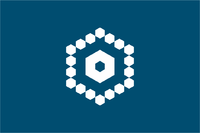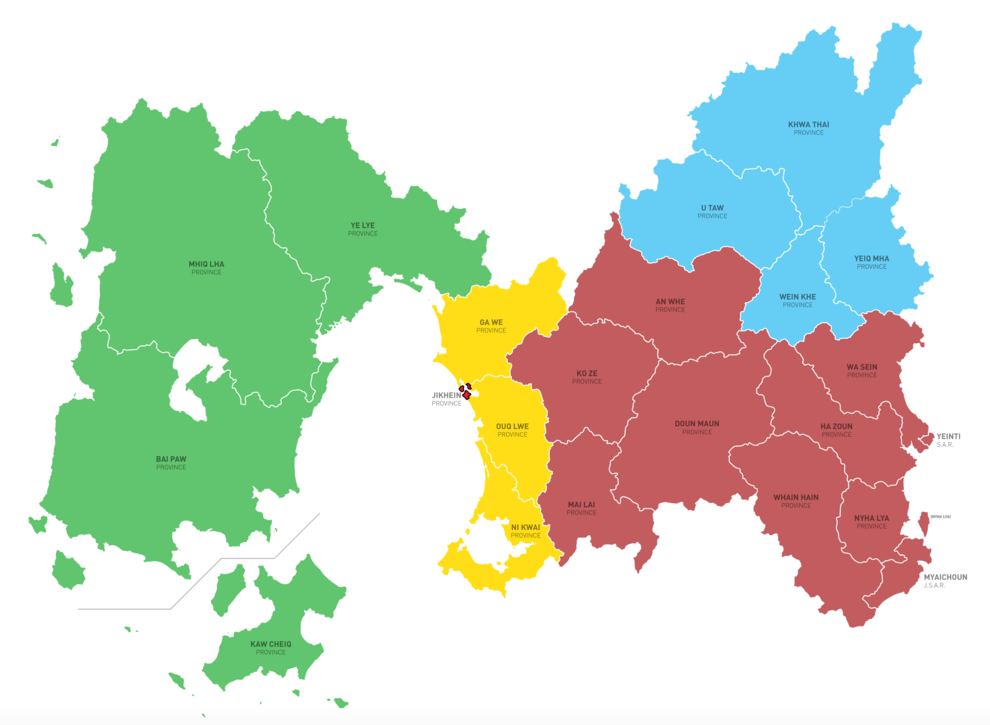Qonklaks
| Qonklese Federation kwai ðá kwan Kwai Jã Kwan (Standard Kwang) |
||||||
|---|---|---|---|---|---|---|
|
||||||
| Motto: “May death come to any who dare challenge us” | ||||||
| Anthem: [Anthem of the Qonklese Federation] | ||||||
| Capital and largest city | Jikring | |||||
| Official languages | Standard Kwang | |||||
| Recognised regional languages | Karduvic Dialect, West Kwang Dialect, Other Kwang lects, Ndxiixun, Riyan | |||||
| Ethnic groups | Qonklese | |||||
| Demonym | Qonklese | |||||
| Government | ||||||
| - | President | |||||
| Legislature | Qonklese National Assembly Hall | |||||
| - | Upper house | Advisory Council | ||||
| - | Lower house | National Assembly | ||||
| Establishment | ||||||
| - | Wa dynasty established | 2520 BC | ||||
| - | Abolition of the monarchy | 1903 | ||||
| - | Kúúlist single-party state | 1950 | ||||
| - | Fall of the Supreme Commune of Qonklaks | 9—22 October 2005 | ||||
| Population | ||||||
| - | 2020 estimate | 114,855,240 | ||||
| - | Density | 101/km2 261.6/sq mi |
||||
| GDP (nominal) | estimate | |||||
| - | Total | $2.341 trillion (8th) | ||||
| - | Per capita | $20,385 | ||||
| Gini | 38.3 medium |
|||||
| HDI | 0.839 very high |
|||||
| Currency | Qonklese Chih (QKC) | |||||
| Time zone | QST (SCT<-1>) | |||||
| - | Summer (DST) | Not Observed (SCT) | ||||
| Date format | (yyyy.mm.dd) Q.I.C. (Qonklese Imperial Calendar) | |||||
| Drives on the | left | |||||
| Calling code | +2 | |||||
| Internet TLD | .qnk | |||||
| This article is part of a series on |
| Soltenna |
|---|
| States |
|
Fordas, The Charter, Soltennan Council Sovereign States
Awarahl, Bosato, Huy En, Kadya, Liosol, Karduv, Lugida, Mai Thi, Nyatol, Qgam, Qonklaks (Yeinti, Macyeaq), Quaxin Xun, Riyana, Ru, Seang Pe, Soptemia, Tzulhon, Xynderland, Yachiro, Zaizung |
| Languages |
| Herdwate, Lithian, Kadic, Kwang, Ndxiixun, Qgam Dzwo, Riyan, Terminian, Tyndal, Xynder, Yachiroese |
| Religions |
| Akalism, Haomism, Iovism |
| Ethnicities |
| Naean people, Hetanic, Kwang, Malas, Methic, Quatic, Rietic, Yachi |
Qonklaks (Qonklese: Kwai Kwan /kwɛ˦ kwã˦/), officially the Qonklese Federation, is a country located in Soltenna. It borders Quaxin Xun, Zaizung, Riyana, Ru, Huy En, and Mai Thi. It shares a maritime border with Awarahl.
As one of Sahar's cradles of civilization, it enjoyed its status as a high culture, its influence traditionally encompassed the entirety of Soltenna.
Qonklaks is a founding member of the International Congress.
Etymology
Kwai is of native Ngerupic origin, meaning 'country', and tracing back to Wa Ñi *kway-ni. Kwan is an endonym possibly related to the Ngerupic root for 'sun', *kwo-ni.
History
---Rework in progress---
Geography
Geology
Climate
Qonklaks is mostly arid and warm in the lowlands, and more humid and cool in the highlands.
Biodiversity
Politics
The Qonklese government is divided into five mè (IPA: /ˈmeɪ/), or branches.
Executive Mè
The Executive Mè, in which executive power is vested, consists of the Central High Command (CHC). The CHC itself consists of the Prime Minister, 16 ministers, and the Director of the State Security and Investigation Service. The CHC is responsible for approving and signing bills into legislation, issuing government decrees, and allocating government spending.
Legislative Mè
The Legislative Mè, which is represented by the National Assembly, is where the people of Qonklaks can practice their democratic powers. The National Assembly, made up of 225 legislators voted into office by their respective electorate districts, is responsible for drafting, debating, and voting for legislation. Currently, the Democratic Guaesuist Union holds the most seats within the National Assembly, with the White Party serving as the main opposition.
Judicial Mè
The Judicial Mè is made up of the Supreme Court and the many regional and local courts. It is responsible for interpreting and enforcing legislation. The Supreme Court itself consists of one Supreme Justice and ten Justices.
Military Mè
The Military Mè consists of the National Defence Council and the Qonklese Peacekeeping Force. Its responsibility to predict and neutralize foreign aggression and assist the Prime Minister in making military decisions. The Military Mè also has the right to refuse to carry out any government decree if they deem it immoral.
Auditory Mè
As the supervisory branch, the Auditory Mè consists of the National Anticorruption Commission (NACC). Although the prime minister selects a new director every term, the NACC has full autonomy, and can even conduct investigations against the prime minister with no consequence.
Administrative divisions
Qonklaks possesses three Special Administrative Regions:
Angnyaiq Special Administrative Region
Myaichoun Special Administrative Region
Yeinti Special Administrative Region
Foreign relations
Qonklaks is in the Soltennan Council comprising of more than X Soltennan states. Today, it has friendly relations with most Sahar nations, except for a few outliers.
Internationalism
Military
Today, Qonklaks provides security to its people and its allies with the Qonklese Peacekeeping Forces, with over 450000 active personnel and 3 million in reserve.
Economy
Qonklaks is a developed country with a moderately high income economy. Brands such as Pearl Corporation and Mheiqyõ Heavy Industries are internationally known and build towards Qonklaks' reputation for manufacturing affordable, quality electronics and motor vehicles.
Despite the kúúlist regime from 1950 to 2005, Qonklaks has since managed to quintuple its GDP thanks to Jiq Zaw's economic reforms in 1972.
Qonklaks is the leading plastic producer, with over 10 billion metric tonnes of plastic made per year.
Transport
Energy
Science and technology
Tourism
Demographics
Ethnic groups
Urbanisation
Language
The official language of Qonklaks is Standard Qonklese. However there are a great many other varieties of Qonklese such as West Kwang. In the south and southwest, there are many minority languages, as well as Ndxiixun, which is the primary language of Quaxin Xun.
Education
The Ministry of Education acts as the supervisory body for every educational institute in Qonklaks, from day cares to tertiary institutions. All schools tend to follow the national curriculum, but due to the introduction of international education institutes in major Qonklese cities, internationally recognised curriculums are increasing in popularity.
School years are divided into two semesters, beginning in March and ending in late Februrary, separated by summer vacation. Students and teachers are granted 53 official summer vacation days, but it is not uncommon for schools to offer more. All elementary and secondary schools enforce a uniform policy. Summer uniforms typically consists of short-sleeved shirts in a light shade, and dark trousers or dress shorts (for boys) and skirts (for girls). In the winter, uniforms may additionally come with a blazer jacket, while some schools may allow students to wear non-uniform jackets as a way to allocate budget elsewhere.
As employers tend to favour those that hold degrees from reputed and prestigious universities domestic and abroad, the education system is rigorous and competitive, and aptly prepares its students for university-level education. However, this almost obsessive drive from teachers wanting their students to succeed and students' culturally-ingrained competitive nature to seek the highest score has caused some scholars and psychologists to raise concerns. Some academics have also blamed the Qonklese education system for encouraging uniformity and conformity and stifling creativity, citing the lack of opportunities for students to pursue artistic endeavours in secondary education in the national curriculum.
Healthcare
Religion
The people of Qonklaks is slowly becoming more and more atheistic, and is pushing religion away from their daily lives. However, government efforts to re-introduce traditional Qonklese Xenhuism as a religion have been proven quite successful.
Culture
Heritage
Architecture
Literature
Art
Music
Theatre
Film
Cuisine
Qonklese cuisine relies heavily on noodles, flatbread, and steamed corn paste for staples, and is typically quite spicy, with abundant use of chili oil and numbing pepper. Being a mainly coastal country, seafood is quite prominent.



